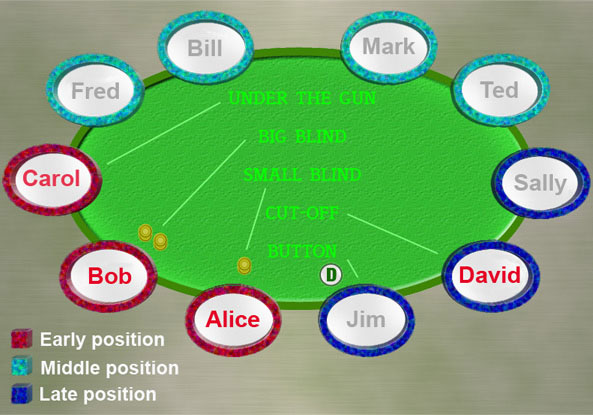Poker Fundamentals
- Introduction to Poker
- Understanding Texas Hold'em
- Fundamentals of Poker Strategy
Fundamentals of Poker Strategy
Understanding Betting: Blind, Call, Raise, Check, Fold

Procedures of betting in poker.
In the game of Texas Hold'em Poker, understanding the different types of betting actions is crucial to your success. Each action has its own strategic implications and knowing when to use each one can significantly improve your gameplay. This unit will cover the five main betting actions: blind, call, raise, check, and fold.
Blind
In Texas Hold'em, the two players to the left of the dealer are required to post a small blind and a big blind, respectively, before the cards are dealt. The blinds are mandatory bets that start the pot and initiate the betting. The size of the blinds dictates the stakes of the game.
The small blind is usually half the size of the big blind. The player who posts the small blind will act first in the betting rounds, while the player who posts the big blind will act last. This is a disadvantageous position as these players will have less information about the other players' actions when they make their decisions.
Call
To call is to match the current highest bet in the round. If no bet has been made, a player cannot call; they must either check or bet. Calling requires a good understanding of your hand's potential and the likelihood that it will improve with the community cards.
Raise
To raise is to increase the current highest bet. When a player raises, they force the other players to put in more money to stay in the hand, which can pressure them into folding. Raising is a powerful tool that can be used to bluff or to increase the pot when you have a strong hand.
Check
If no bet has been made in the current round, a player can choose to check, which means they do not bet and the action moves to the next player. If all players check, the round is over and the next community card is dealt. Checking allows a player to see the next card for free, but it also shows weakness, which can be exploited by aggressive players.
Fold
To fold is to discard your hand and forfeit any chance of winning the current pot. When a player folds, they are out of the action until the next hand is dealt. Folding is the safest action, as it guarantees that you will not lose any more money on the hand. However, folding too often can make you predictable and easy to bluff.
In conclusion, understanding when to blind, call, raise, check, or fold is a fundamental part of poker strategy. Each action has its own time and place, and knowing when to use each one can give you a significant edge over your opponents.